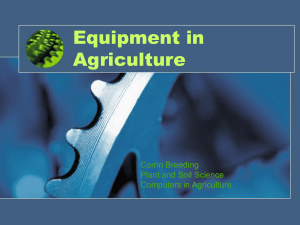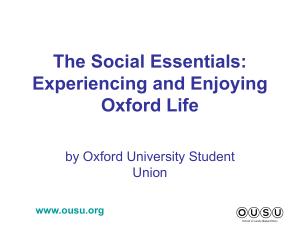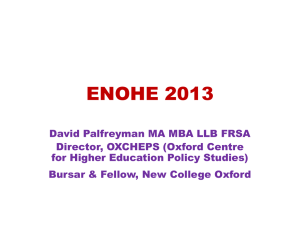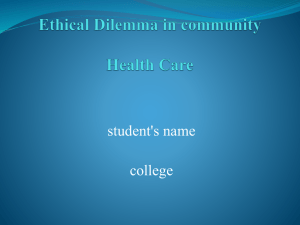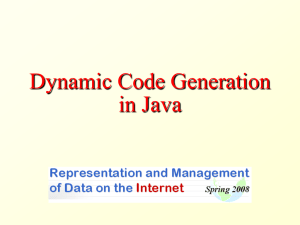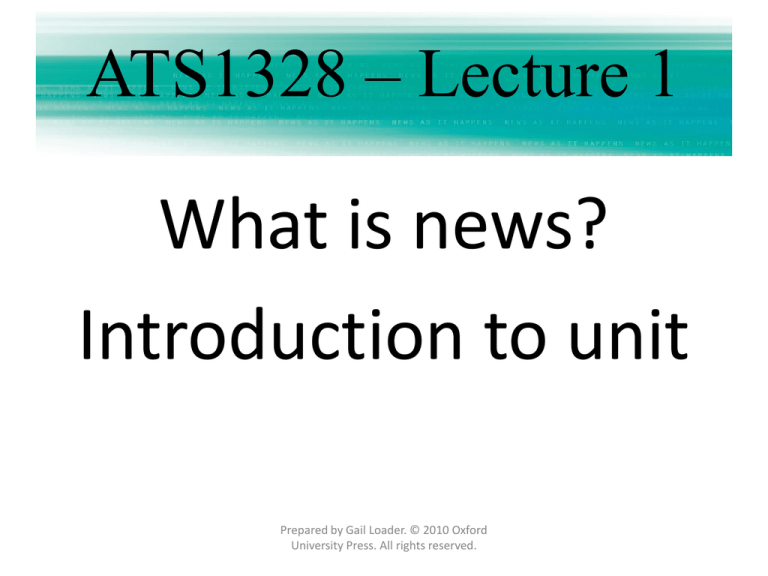
ATS1328 – Lecture 1
What is news?
Introduction to unit
Prepared by Gail Loader. © 2010 Oxford
University Press. All rights reserved.
Today
What is news
Course structure
Unit requirements
Prepared by Gail Loader. © 2010 Oxford
University Press. All rights reserved.
What is news?
London G-20 protests 2009
…and the Ian Tomlinson affair
http://www.youtube.com/watch?v=SYM3KOByTDw
News is, firstly, THE TRUTH.
You can’t make it up.
We don’t want your opinion.
Prepared by Gail Loader. © 2010 Oxford
University Press. All rights reserved.
News vs opinion
Journalists write for their readership and
audiences – never themselves
Comment and opinion are NOT news
Journalists must distinguish between news,
comment and opinion
Mixing them has legal implications
People do not like being told what to think!
Prepared by Gail Loader. © 2010 Oxford
University Press. All rights reserved.
What is news?
London G-20 protests 2009
…and the Ian Tomlinson affair
News is, firstly, THE TRUTH.
You can’t make it up.
We don’t want your opinion.
You must get the facts right.
Prepared by Gail Loader. © 2010 Oxford
University Press. All rights reserved.
What is news?
Masterton’s “essential” news values:
interest
timeliness
clarity
Prepared by Gail Loader. © 2010 Oxford
University Press. All rights reserved.
What is news?
Masterton’s “big six” news values (in order):
1. Significance/impact
2. Proximity
3. Conflict
4. Human interest
5. Novelty – rare or unusual
6. Prominence
Prepared by Gail Loader. © 2010 Oxford
University Press. All rights reserved.
Definitions of news
Anything that makes a reader say ‘Gee whiz!’
(Arthur MacEwen 1971)
News is information about a break from the
normal flow of events, an interruption in the
expected
News is information people need to make
sound decisions about their lives (Melvin
Mencher 1997)
Prepared by Gail Loader. © 2010 Oxford
University Press. All rights reserved.
Definitions of news
The first rough draft of history (Philip Graham,
former publisher Washington Post)
News is what somebody somewhere wants
to suppress; all the rest is advertising. (Lord
Northcliffe, publisher 1865-1922)
Journalism is literature in a hurry. (Matthew
Arnold, British poet and critic)
Prepared by Gail Loader. © 2010 Oxford
University Press. All rights reserved.
Definitions of news
The real news is bad news. (Marshall Mcluhan,
communications theorist)
Journalism consists largely in saying Lord
Jones died to people who never knew Lord
Jones was alive. (G.K. Chesterton, British writer)
People may expect too much of journalism.
Not only do they expect it to be
entertaining, they expect it to be true. (Lewis
H.Lapham, American
publisher
and
editor,
Prepared
by Gail Loader.
© 2010
Oxford b. 1935)
University Press. All rights reserved.
Who decides?
News-making decision maker (“gatekeepers”):
– Editors
– Chiefs-of-staff
– News producers: broadcast, online and radio
The public:
– readers, listeners, viewers
The new world of “citizen journalism”
Prepared by Gail Loader. © 2010 Oxford
University Press. All rights reserved.
How do they decide?
Instinct – they understand their audience
Big stories are obvious, eg natural disasters,
terrorist attacks
Response to market research and focus
groups
An interesting photo, sound grab or video
Prepared by Gail Loader. © 2010 Oxford
University Press. All rights reserved.
Context of news
Influenced by:
culture
climate
beliefs
political orientation
religious orientation
sex
education level
Prepared by Gail Loader. © 2010 Oxford
University Press. All rights reserved.
The media’s role
The functions of news media are to:
Inform
Educate
Entertain
Prepared by Gail Loader. © 2010 Oxford
University Press. All rights reserved.
The media’s role
“Fourth Estate” role
Help keep governments honest
Help us view our world in context
Warn of dangers and deceptions
Help right injustices
Expose hypocrisy
Prepared by Gail Loader. © 2010 Oxford
University Press. All rights reserved.
The media’s role
Other roles
Promote health and safety
Help us make informed choices
Allow us to express our opinions and feelings
Draw communities together in times of
trouble
Prepared by Gail Loader. © 2010 Oxford
University Press. All rights reserved.
Two types of reporting
Reactive: comes from a newsworthy event –
something happens, a journalist reports the
story
Proactive: comes from an idea, research, tip
or discovery – includes investigative articles,
exposes and exclusive interviews
Prepared by Gail Loader. © 2010 Oxford
University Press. All rights reserved.
Unit requirements
Prepared by Gail Loader. © 2010 Oxford
University Press. All rights reserved.
The course
Prepared by Gail Loader. © 2010 Oxford
University Press. All rights reserved.
Unit guide
Read it!
• Learning objectives(p.1)
Prepared by Gail Loader. © 2010 Oxford
University Press. All rights reserved.
Schedule:
“print”
Prepared by Gail Loader. © 2010 Oxford
University Press. All rights reserved.
Schedule:
radio
Prepared by Gail Loader. © 2010 Oxford
University Press. All rights reserved.
Attendance
• Minimum requirements
• Penalties for non-compliance – possible failure
of unit
(Unit guide p. 6)
• Weekly readings – essential
• Tutor and Unit Coordinator contact details
(front page of guide)
Prepared by Gail Loader. © 2010 Oxford
University Press. All rights reserved.
Assessments
Prepared by Gail Loader. © 2010 Oxford
University Press. All rights reserved.
Essential texts
Lamble, S., 2011, News As It
Happens, OUP, South
Melbourne
Phillips, G., Lindgren, M.,
2006, Australian Broadcast
Journalism, 2nd edition,
OUP, South Melbourne
Prepared by Gail Loader. © 2010 Oxford
University Press. All rights reserved.
Weekly reading
• See Unit schedule
• Weekly readings – essential
• Tutor and Unit Coordinator contact details
(front page of guide)
Prepared by Gail Loader. © 2010 Oxford
University Press. All rights reserved.
Contacts
• See Unit guide
• Robert Carey
– Phone: 9903 4093
– robert.carey@monash.edu
– Room B4.36
Prepared by Gail Loader. © 2010 Oxford
University Press. All rights reserved.




